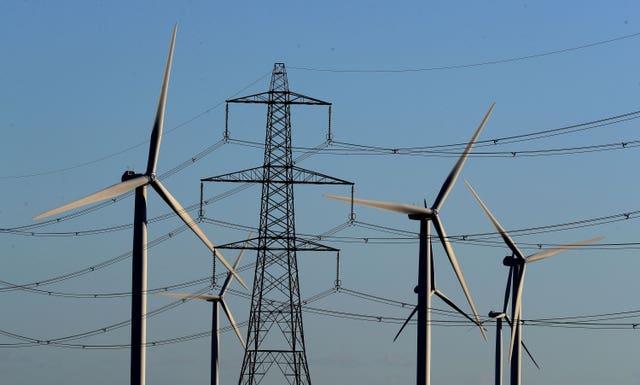Chief executive Keith Anderson said ScottishPower has a spending programme of £12 billion in the years to 2028, but that he would “love to double that by the time we get to 2030”.
Though he stopped short of committing the funding, he told the PA news agency: “If the Government can halve the time it takes to get projects through planning, I’ll double the amount I invest in this country.
“The Government wants to get clean power by 2030, it wants to quadruple offshore wind by 2030.
“To get there, companies need to double the amount that they invest in (the UK), and that’s what we want to do.”
ScottishPower supplies energy to 4.4 million homes and businesses, builds onshore and offshore wind farms and runs vast tracts of the power grid across Scotland, and parts of England and Wales.
The money would go towards green energy projects such as putting up more wind turbines, he said, as well as improving the size and scope of the grid, which is expected to come under strain because of the shift to renewables.

However, the plans hinge on whether Labour’s reforms to planning and energy policy bear fruit.
Earlier this month, energy secretary Ed Miliband scrapped a de facto ban on onshore wind farms, reversing planning measures brought in for England by the Conservatives in 2015 under David Cameron.
Onshore wind was treated differently from other developments under the rules, which stopped schemes going ahead if there were any objections.
Mr Anderson said: “If we can build a project in two years then it shouldn’t be sitting in the planning system for any more than two years. Right now these projects can sit there for over seven years.
“The Government is saying they are focused on accelerating projects through that system, and that’s exactly what we want to see.”
Labour said on Thursday that it will also partner with the monarchy’s property firm, the Crown Estate, which owns the UK’s seabeds, to help speed up investment and building of offshore wind farms, through its new state-owned energy company GB Energy.
Business groups urged the Government to give more detail on how the partnership would work in practice, to assuage concerns that GB Energy could act as a competitor and impede firms’ plans to invest.
Dan McGrail, chief executive of energy business group RenewableUK, said it is “vital that (GB Energy) doesn’t disrupt the billions of pounds of private investment the Government will need to deliver their clean power ambitions, so the next steps of its development will have to be formed in close partnership with the sector”.
Speaking before the GB Energy announcement, Mr Anderson said he is “optimistic” after seeing Sir Keir Starmer speak at a gathering of business leaders in the garden of 10 Downing Street on Wednesday.
“Whether that’s at the reception (on Wednesday), or at some of the other meetings we’ve been at over the last 10 days with the Government, there is a very positive atmosphere that things are going to change, that we’re going to work together and that we’re going to get this economic growth.”
This government will work in partnership with businesses to deliver economic growth.
Here’s what business leaders think👇 pic.twitter.com/kGrhm6o875
— UK Prime Minister (@10DowningStreet) July 24, 2024
A complicating factor is that it is ultimately a decision for his bosses at Spanish energy giant Iberdrola, which owns ScottishPower and also has subsidiaries across the Americas.
Mr Anderson said: “We compete for capital as a country, alongside Spain, America, Brazil and Mexico because we’re investing in lots of different countries.
“The faster I can get projects through the (planning) process, the more I can compete and accelerate the amount of capital I can get hold of.”
















